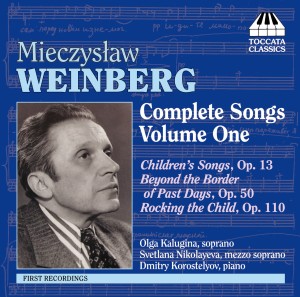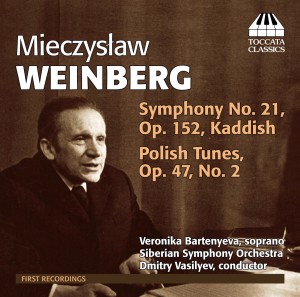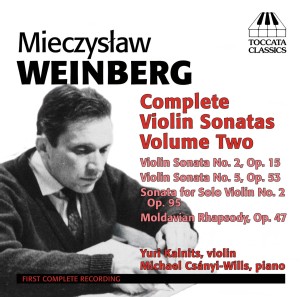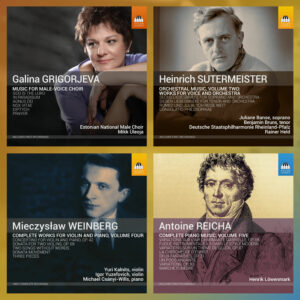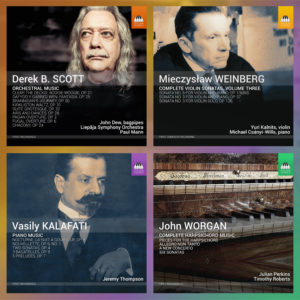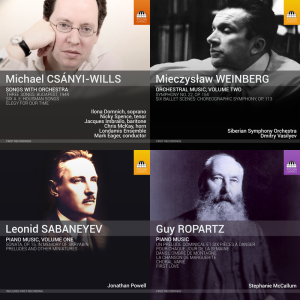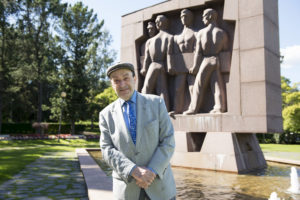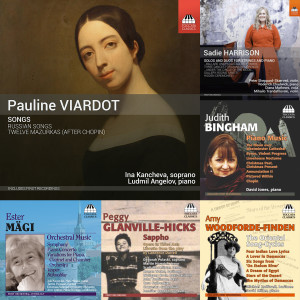Search Results for "Weinberg"
Mieczysław Weinberg: Complete Works for Violin and Piano, Volume Four
In the past twenty years the Polish-born, Moscow-based Mieczysław Weinberg (1919–96) has been recognised as one of the major voices in twentieth-century music, equivalent in stature to his close friend Dmitry Shostakovich. This fourth and final volume of his music for solo violin, violin and piano and two violins completes the only survey to take all of these works into account. It presents music ranging from a startingly assured early score by the teenage Weinberg to works in which his personality is fully established and instantly recognisable.
Yuri Kalnits, violin
Igor Yuzefovich, violin (10–12)
Michael Csányi-Wills, piano (1–9)
Mieczysław Weinberg: Complete Songs, Volume One
Mieczysław Weinberg (1919-96), the Polish-born composer who spent most of his life in the Soviet Union, was a close friend of Shostakovich, with whose musical language his own has much in common. Weinberg's vast output includes 26 symphonies, seventeen string quartets and some 200 songs. The three song-cycles recorded here date from across Weinberg's career. They demonstrate his extraordinary ability to create atmosphere, often from just a handful of notes, and encompass a wide range of emotion, from wartime suffering, through playfulness and protest, to maternal love.
Olga Kalugina, soprano
Svetlana Nikolaeva, mezzo soprano
Dmitry Korostelyov, piano
Mieczysław Weinberg: Complete Violin Sonatas, Volume Three
If Mieczysław Weinberg had lived for another decade or so after his death in 1996, he would have seen his status change from poorly known outlier to general acceptance as one of the major twentieth-century composers. His violin works have likewise been recognised as major additions to the repertoire. Since Yuri Kalnits and Michael Csányi-Wills began what will be a four-volume survey of Mieczysław Weinberg’s music for violin and piano, other musicians have discovered and recorded many of these masterworks, but on its completion this cycle will still be the first to record all of Weinberg’s violin works.
Yuri Kalnits, violin
Michael Csányi-Wills, piano
Mieczysław Weinberg: Orchestral Music, Volume Two
In the twenty years since his death the star of the Polish-born Moscow-based Mieczysław Weinberg (1919–96) has risen rapidly: his music – a highly individual amalgam of the Jewish idioms of his youth and the style of his mentor and friend Dmitry Shostakovich – is now seen as one of the most distinctive contributions to twentieth-century music. This further instalment in the Toccata Classics examination of his output couples a mature dance-based score – not performed before this recording – with his last symphony, orchestrated after his death by the composer Kirill Umansky.
Siberian Symphony Orchestra
Dmitry Vasiliev
Mieczysław Weinberg: Music for Orchestra
Mieczysław Weinberg, born in Warsaw in 1919, became a close friend of Shostakovich in Moscow, after fleeing eastwards before the invading Nazis in 1939. His style has much in common with Shostakovich's: fluent contrapuntal skill, a keen feeling for melody, often inflected with Jewish cantilena, and an acute sense of drama which combines a natural narrative manner with an extraordinary ability to create atmosphere. Since his death in 1996, his vast output — which includes 26 symphonies, seven operas and seventeen string quartets — has enjoyed increasing recognition as some of the most individual and compelling music to have been composed in the twentieth century. This recording pairs an early orchestral work, the suite Polish Tunes of 1950, with the last full orchestral symphony he was to complete, dedicated to the memory of those who died in the Warsaw Ghetto.
Veronika Bartenyeva, soprano
Siberian Symphony Orchestra, orchestra
Dmitry Vasilyev, conductor
Mieczysław Weinberg: Complete Violin Sonatas, Volume Two
Mieczysław Weinberg, born in Warsaw in 1919, became a close friend of Shostakovich in Moscow, after fleeing eastwards before the invading Nazis in 1939. His style has much in common with Shostakovich, as these four violin works show: fluent contrapuntal skill, a keen feeling for melody, often inflected with Jewish cantilena, and an acute sense of drama which combines a natural narrative manner with an extraordinary ability to create atmosphere, often from just a handful of notes. Since his death in 1996, his music has increasingly been recognised as some of the finest by any twentieth-century composer.
Yuri Kalnits, violin
Michael Csányi-Wills, piano
Mieczysław Weinberg: Complete Violin Sonatas, Volume One
Mieczysław Weinberg, born in Warsaw in 1919, became a close friend of Shostakovich in Moscow, after fleeing eastwards before the invading Nazis in 1939. His vast output includes 26 symphonies, seven operas, seventeen string quartets and much other chamber music and some 200 songs. His style has much in common with Shostakovich, as these four violin works show: fluent contrapuntal skill, a keen feeling for melody, often inflected with Jewish cantilena, and an acute sense of drama which combines a natural narrative manner with an extraordinary ability to create atmosphere, often from just a handful of notes. Since his death in 1996, his music is being discovered by musicians and listeners all around the world.
Yuri Kalnits, violin
Michael Csányi-Wills, piano
January 2023 Bundle
Included in this bundle:
March 2021 Bundle
Included in this bundle:
December 2015 Bundle
Included in this bundle:
Too Many Symphonies? — Part two: Fridrich Bruk
Having traversed the symphonies of Robert Keeley in Part One of this brief survey (Too Many Symphonies – Part One – posted on 9 March…
Where are the Women Composers?
Women Composers Bundle Time for a little controversy on this blog – but that’s not my aim, which is to try to understand why, when…
Noah Max in Conversation with Martin Anderson
In March 2022 Toccata Classics released an album of music by Noah Max (b. 1998) – painter, poet and conductor as well as composer. Since…
Stay In the Know
JOIN THE TOCCATA NEWSLETTER
"*" indicates required fields
By visiting our site, you agree to our privacy policy regarding cookies, tracking statistics, etc.

